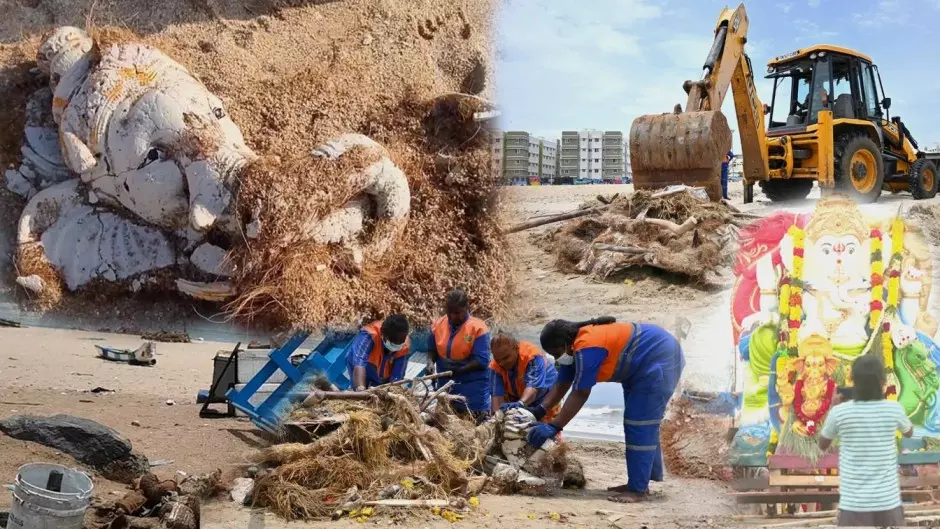
2,000 idols, 70 tonnes of waste: Aftermath of Ganesh immersions in Chennai | The Federal
Chennai beaches buried in waste after Ganesh idol immersions
Over 2,000 POP idols with toxic paints left Chennai’s shores clogged with 70 tonnes of waste. Can eco-friendly clay idols offer a cleaner future?

Chennai’s iconic beaches are reeling under tonnes of waste following this year’s Ganesh idol immersions. From Pattinapakkam to Kasimedu and Thiruvottriyur to Palavakkam, the sands are buried in plaster of Paris (POP) fragments, coir stuffing, flowers, wooden frames, and synthetic paint residues.
More than 2,000 idols were immersed in the sea across the city, despite bans on POP idols and chemical paints issued by the Pollution Control Board. Civic workers have been pressed into action with earthmovers and trucks to clear the mess. The Chennai Corporation reported that nearly 70 tonnes of garbage have already been removed from the shores.
Heavy machinery is being used to lift wooden frames and idol debris onto lorries. Yet, experts warn that these clean-up efforts are superficial and fail to address the long-term damage caused to marine life.
Hidden dangers
Environmentalists caution that POP idols do not dissolve easily and remain underwater for months, poisoning fish and marine ecosystems.
“Immersing these idols with synthetic paints and POPs in the oceans will completely destroy the marine ecosystem and create a health hazard as fish consumed by people will carry these toxins,” an expert warned.
Court and National Green Tribunal (NGT) orders have repeatedly banned such practices, yet enforcement remains weak. Experts argue that allowing idol immersions with hazardous materials amounts to endangering both environmental safety and public health.
Eco-friendly options
The environmental community is urging stricter action, including heavy fines under the “polluter pays” principle, to deter offenders. Advocates say the only viable alternative is the use of eco-friendly clay idols.
“The best way is to build smaller idols made only of clay. Clay dissolves naturally in water without creating an environmental hazard,” an activist explained.
Attempts to find synthetic substitutes, they argue, could worsen the crisis. Instead, they emphasise public awareness campaigns and enforcement of eco-friendly traditions as the only sustainable solution.
The way forward
Experts stress that future Ganesh Chaturthi celebrations must prioritise clay idols and strict enforcement of bans on POP and synthetic paints. Without these measures, Chennai’s beaches and marine ecosystems will continue to pay a heavy price after every festival.
Until awareness deepens and authorities act firmly, the cycle of celebration followed by ecological damage is likely to repeat itself year after year.
The content above has been transcribed using a fine-tuned AI model. To ensure accuracy, quality, and editorial integrity, we employ a Human-In-The-Loop (HITL) process. While AI assists in creating the initial draft, our experienced editorial team carefully reviews, edits, and refines the content before publication. At The Federal, we combine the efficiency of AI with the expertise of human editors to deliver reliable and insightful journalism.

